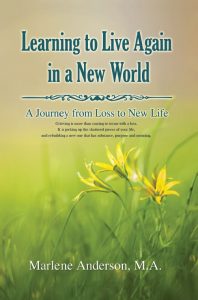Listen to this episode of the Focus With Marlene Podcast
Click here to listen to today’s podcast episode.
Click here to get caught up on all episodes in this series on recovering from loss.
“Gratitude is a powerful catalyst for happiness. It’s the spark that lights a fire of joy in your soul.”
—Amy Collette
You may be wondering why I am spending so much time on humor, laughter, blessings and gratitude in this series. I am because they are such powerful mindsets that can overcome depression, sorrow, and hopelessness.
They are some of life’s most powerful tools that can be used every day in many circumstances to lift our spirits and motivate us to look for ways to accomplish goals and be happy. This is especially beneficial when healing from a loss.
Gratitude
Did you know that just by searching for positive things to be grateful for, you are activating your brain to produce more feel-good hormones? Just by the process, you are changing how your brain is working. Wow – I think that’s pretty significant!
Then why don’t we focus more on all the blessings and things we can be grateful for rather than the things that make us upset and unhappy?
“Gratitude makes sense of our past, brings peace for today, and creates a vision for tomorrow.”
—Melody Beattie
We have all suffered unspeakable tragedies, and people wonder how they will survive, go on, rebuild, find joy again. Yet we can and do.
Focusing on the positive doesn’t mean we don’t need to spend time identifying and resolving problems. Instead, it helps us recognize and specifically interpret the problems we need to resolve instead of just focusing on the symptoms that make us feel miserable.
“In ordinary life, we hardly realize that we receive a great deal more than we give, and that it is only with gratitude that life becomes rich.”
—Dietrich Bonhoeffer
As a former teacher, facilitator and therapist, I encourage people to challenge negative thinking and replace it with a more positive and objective point of view. I do the same with myself.
How we react and interpret problems will help us find solutions.
While events and people can make us angry or discouraged, we do not need to stay in that position. We can alter our response.
This is not a Pollyanna approach where everything is okay. A positive attitude recognizes that if there is bad stuff happening, there is also good stuff. The good stuff, however, tends to be overshadowed or colored by the bad stuff that holds us captive.
“Gratitude turns what we have into enough.”
—Anonymous
In last week’s post, I asked you to look for blessings. We find gratitude the same way and they overlap in many ways. Gratitude can be as simple as I am grateful to be alive. I am grateful I can decide how I will use my time and energy.
Gratitude is being thankful for all the things we have. It is a recognition and appreciation for the unexpected blessings that pop into our lives and expressing that thankfulness in some way.
“Life is a gift. Never forget to enjoy and bask in every moment you are in.”
—Unknown
Consider the choices you are making
We are making choices all the time. We choose how we want to look at life. We choose the actions we will take. We can focus on constructive planning and managing our time, or we can focus on doing whatever feels good in the moment.
We can choose to worry, or we can choose to put our energy into problem solving. We can choose to be mindless, or we can choose to think of ways to develop a purpose for our life.
Some things to consider:
We choose our attitudes and responses to life situations
- Bitterness or gratitude
- Resentment or extending grace
- Negative comparisons or personal self-worth
- Anger or reconciliation
- Anxiety and fear or faith and promise
- Belief in God or being my own god
- Integrity, honesty, generosity or self-centeredness, greed, what’s in it for me
We choose our mindsets and patterns of behavior
- What I can do vs what I can’t do
- Finding solutions rather than remaining in a state of helplessness
- Acceptance of events and moving forward or resisting and remaining stuck
- Personal responsibility vs the blame game
- Forgiveness vs revenge
- Assessing options, taking a risk vs panic, fear and worry
- Focus on similarities and agreement vs division and differences
We choose our lifestyle
- Letting go of critical self-talk or affirming our strengths and abilities
- Self-discipline and regulation instead of whatever feels good in the moment
- Principles and values vs whatever the current culture dictates
- Long-term goals vs immediate gratification
- Developing good friendships and safe environments vs being one of the crowd
Take a moment and reflect on the choices you are making every day.
- Which ones help you solve problems and energize your efforts?
- Which ones focus only on what isn’t working and creates even more conflict?
- What choices can you make that will activate more gratitude and maximize your happiness?
 Learning to Live Again in a New World
Learning to Live Again in a New World
We need validation for the turmoil of thoughts and emotions we experience. But we also need the tools necessary to create a new beginning that is both satisfying and meaningful. My new book, Learning to Live Again in a New World, offers those tools to help work through the problems you might be facing.
It is a guide to help you through the ups and downs of grieving a significant loss. And it includes a study guide at the end for use with groups.
Marlene Anderson

